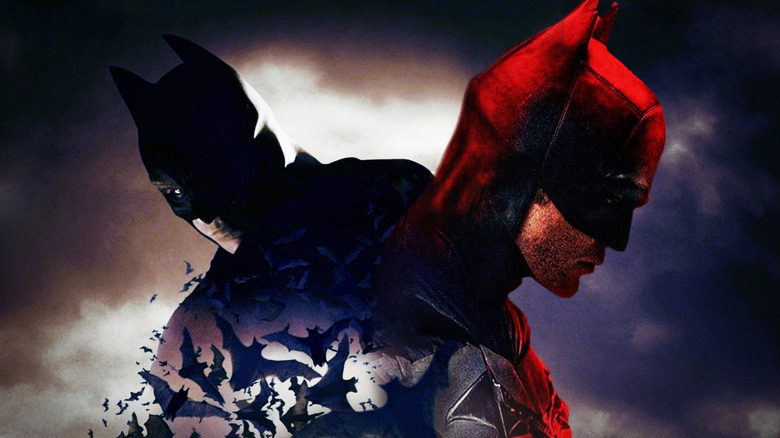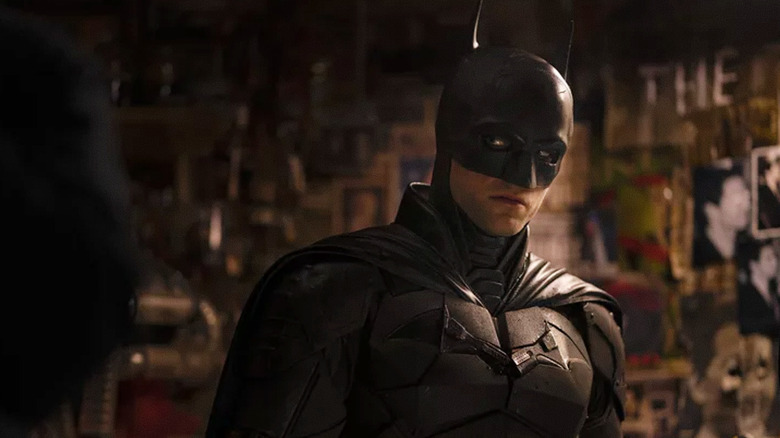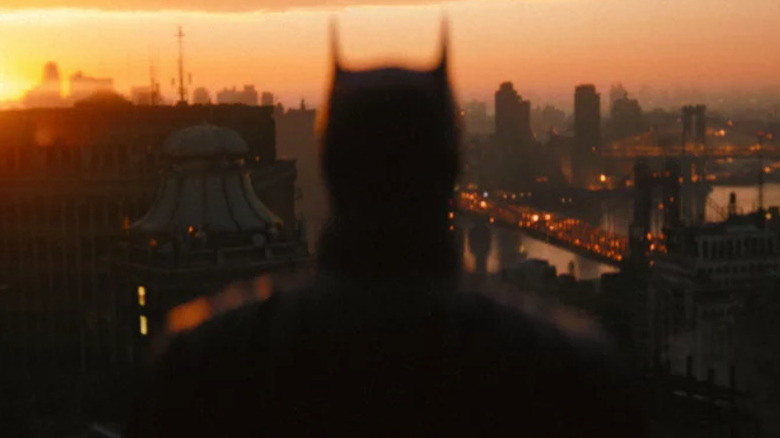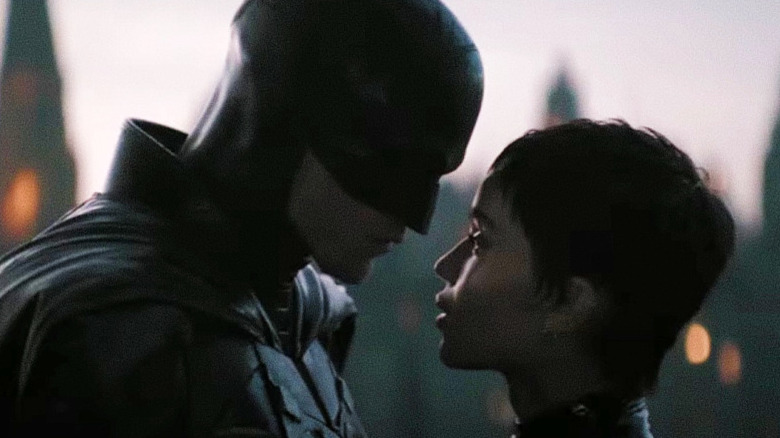The Batman Borrows A Few Key Christopher Nolan Ideas — And Breaks The Rest
Warning: spoilers ahead for "The Batman"
To make a comparison between Christopher Nolan's "The Dark Knight" trilogy and Matt Reeves' "The Batman" is as tedious as it gets; the success of a beloved trilogy should not be the sole reference point for appreciating Reeves' vision (and frankly, comparison was never the point). "The Batman" most definitely is informed by Nolan's world, be it the deeply politicized nature of Gotham City that is portrayed with grounded realism, or the very character of Batman himself, who gradually transitions to a headspace that allows him to parse the true meaning of justice. However, Reeves' world is very much its own, succeeding in carving its own legacy whilst being authentic to the character's wide-ranging lore (both comics and live-action).
Of course, "The Dark Knight" stands out like a beacon amongst Nolan's trilogy — mostly due to the gut-wrenchingly anarchic nature of the narrative and Heath Ledger's electrifying Joker. However, as Reeves' Bat-verse is only in its initial stages of development, it is a bit too early to say how it will treat some of its iconic characters (an alliance/rivalry between the Riddler and the Joker is probable, as previously delved into in "Batman: The War of Riddles and Jokes"). Nevertheless, it is interesting to dive deeper into the psyches of the two directors, their individual approaches to the beloved superhero, and the mechanics of worldbuilding that wonderful enmesh, yet remain distinctly different in their own right.
"A diamond plate, a glowing grate, a place you never leave..."
The city of Gotham, although situated in the real world, always exuded an identity of its own, which has been treated in differing ways by Batman movie directors, depending on their aesthetics. Tim Burton's Gotham is wrapped in an aura of fantastical make-believe, birthing supervillains steeped in excess theatricality (although equally iconic in their own way) and a twisted sense of the macabre. Nolan's rendition of Gotham is extremely grounded, as evidenced in "Batman Begins:" the run-down nature of the Narrows, whose darkest alleyways shelter the seediest underbelly of crimes come to mind, alongside the range of antagonists, whose actions stem from the neglect/pain inherent within life (or sometimes, they just want to watch the world burn). The dark, gritty nature of Gotham dissipates by "The Dark Knight Rises," which transforms more into a war-torn, postmodern wasteland, exacerbated by the presence of Bane.
Reeves' "The Batman" retains these elements but heightens them considerably: his Gotham is also a cesspool of crime, corruption, and covert cover-ups, but there is something hopelessly cynical about the way in which it is portrayed. Reeves' Gotham embrace's the city's comic book roots, realistic yet fantastical all at once, an element that is accentuated by Michael Giacchino's grand, somber, and simply put, beautiful score. From both an aesthetic and narratorial perspective, Gotham in "The Batman" is added in the garb of crime-noir, starting from its perennially rain-drenched streets to its run-down, dilapidated buildings, in stark juxtaposition with the more "modernized" parts of the city, steeped in neon lights and an interplay of light and shadows. The criminals in Gotham come to play at night, but so does Batman: lurking in the darkness, his heavy boots reverberating with dripping menace, striking fear in the hearts of those predisposed to crime.
The socio-economic aspect of Gotham city is integral to both directors, as greed drives most of the corrupt officials in Nolan's world, and there is a wide, ever-increasing gap between the privileged and those struggling to survive. "The Batman" explores this aspect with greater depth, helming it as of the core motivators behind the Riddler's actions, whose disdain for Gotham's elite stems from this very gap in the status quo, and his own childhood at the Wayne Orphanage, wherein he was prone to hardships and neglect after Thomas Wayne's death. This, in fact, fuels his need to be seen, heard, remembered, propelling him to venture a dangerously twisted path for revenge, something he refers to during his conversation with Batman in Arkham. Reeves' Gotham, a grim city of evils, births greater evil in the process, snuffing all semblance of hope for the average Gothamite, which is exactly why the city needs Batman to be a symbol of hope rather than fear or vengeance, now more than ever.
Masked vigilante or billionaire philanthropist?
Nolan's rendition of Batman introduced the dichotomy inherent within his dual personas to remarkable effect. The visible toll of being a charming, indifferent billionaire by day and an instrument of justice by night created an interesting tussle within his psyche, wherein Bruce/Batman struggled to keep the scales balanced. This, of course, changes as the trilogy progresses, harkening his transformation into the "dark knight" Gotham needs to survive another day, and this sacrifice comes at a great personal cost.
Nolan's Batman goes from being anguished about the injustice of his parent's death to deftly honing his skills under the guidance of Ra's al Ghul, then facing the increasingly anarchic figures that threatened to suffocate Gotham head-on, while understanding what it meant to sacrifice for the greater good. Nolan's Batman relies heavily on his resources to carry out his mission, building the legacy of Wayne Enterprises and that of the caped crusader simultaneously, often losing parts of himself to the greater cause, but regaining his sense of self and achieving balance in the end.
"The Batman" is the first and only film in the Bat-verse so far, and focuses on the caped crusader's second year of crime-fighting in Gotham. This version of Batman is completely immersed into his vigilante persona, throwing himself headfirst into the heart of danger every night for the sake of the city, as he feels it is the only way to continue his father's legacy. Bruce is so utterly broken by the loss of his parents, his grief, his mounting helplessness despite doing what he needs to do every night, that he is incapable of embracing his Bruce Wayne persona at all unless he absolutely needs to in order to solve a crime or catch a killer. This blatant self-effacement is indicative of the fact that it is too early for him to come to terms with the fact that Gotham needs Bruce Wayne too, more so due to his father's legacy of genuine philanthropy and the immense privilege he hails from.
This aspect is reflected in Bella Reál's conversation with Bruce in the funeral scene, wherein she bluntly says that he could be doing much more for the city, and to her knowledge, has done nothing so far. This, of course, is not true, as he is doing his utmost best to enact vengeance, but soon realizes an uncomfortable truth: vengeance begets vengeance, inspiring criminals instead of the average Gotham citizen. What marks Reeves' titular hero apart from Nolan's, is, of course, his detective roots, as Bruce/Batman is less reliant on technology and more so on his knowledge of ciphers and his relentless sleuthing skills. This aspect makes Reeves' Batman more grounded and in touch with his organic abilities, which perfectly complements and enhances his gritty, noir narrative, which is more intense and darker in tone when compared to Nolan's narratives.
Carving a legacy of its own
In essence, Reeves' "The Batman" is pulpier, more grounded in cynical realism in various aspects, and much bolder in terms of representing Gotham and its grimmest, nastiest pockets. There is a sense of unrestrained mystery, adventure, and even romance (sexual tension and endearing emotionality go hand-in-hand in all of the Batman/Selina Kyle scenes) in "The Batman," which carves out its own legacy with its masterful treatment of several iconic characters.
Inevitably, there's more to come: with Gotham now in a vulnerable state and a power vacuum created, this creates an opening for newer players to emerge, alongside already-introduced characters such as the Penguin assuming a more central role in terms of wanting to take control of the city. With Bruce/Batman understanding what he means to the people of Gotham, and who he must be in order to ensure that the city survives, will definitely be an interesting arc to witness. Gotham views Batman in a different light too: he is no longer a "freak" in a bat costume, but a symbol of hope, and the faint promise that he will be there to usher in the light when Gotham is submerged in nefarious darkness again.
"The Batman" is in theaters now.



